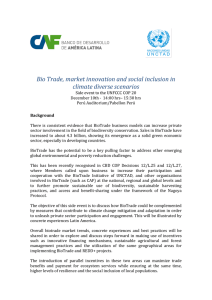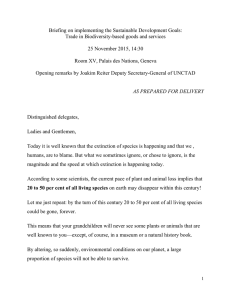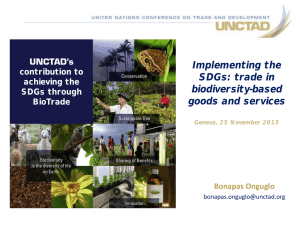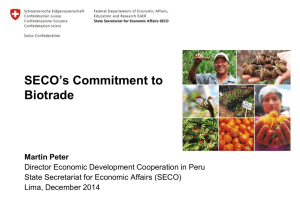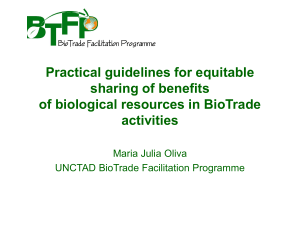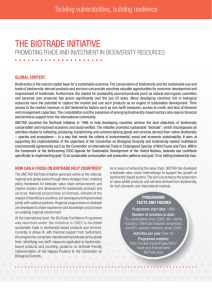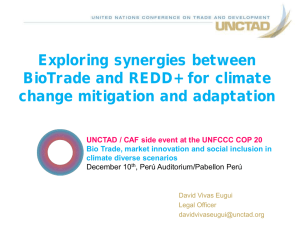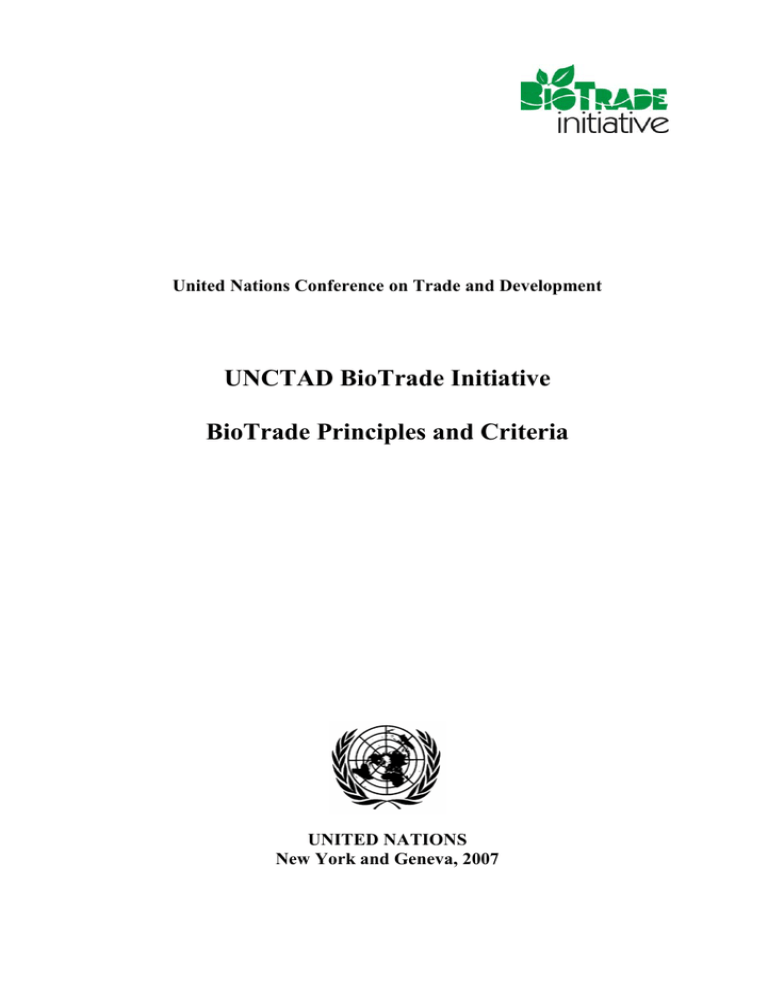
United Nations Conference on Trade and Development
UNCTAD BioTrade Initiative
BioTrade Principles and Criteria
UNITED NATIONS
New York and Geneva, 2007
NOTE
The views expressed in this volume are those of the authors and do
not necessarily reflect the views of the United Nations Secretariat.
The designations employed and the presentation of the material do
not imply the expression of any opinion whatsoever on the part of the
United Nations Secretariat concerning the legal status of any country,
territory, city or area, or of its authorities, or concerning the
delimitation of its frontiers or boundaries.
Material in this publication may be freely quoted or reprinted, but
acknowledgement is requested, together with a reference to the
document number. A copy of the publication containing the quotation
or reprint should be sent to the UNCTAD secretariat.
UNCTAD/DITC/TED/2007/4
For further information on the BioTrade Initiative of UNCTAD,
please check the following website:
http//www.unctad.org/biotrade
or contact: biotrade@unctad.org
UNITED NATIONS PUBLICATION
Copyright © United Nations, 2007
All rights reserved
ii
Contents
Page
Abstract....................................................................................................
iv
I.
Introduction ......................................................................................
1
II. Application .......................................................................................
4
III. Document Structure ..........................................................................
4
IV. BioTrade Principles and Criteria adopted by the UNCTAD
BioTrade Initiative............................................................................
5
P1
Conservation of biodiversity ...................................................
5
P2
Sustainable use of biodiversity................................................
6
P3
Fair and equitable sharing of benefits derived from the use of
biodiversity..............................................................................
7
Socio-economic sustainability (productive, financial and
market management) ...............................................................
8
P4
P5
Compliance with national and international regulations ......... 10
P6
Respect for the rights of actors involved in BioTrade
activities .................................................................................. 11
P7
Clarity about land tenure, use and access to natural resources
and knowledge ........................................................................ 12
iii
UNCTAD BioTrade Principles and Criteria
Abstract
The BioTrade Principles and Criteria have been defined by the UNCTAD
BioTrade Initiative and the BioTrade national programmes, and provide the
core of the conceptual framework underlying the BioTrade Initiative's
activities. They are in line with the objectives and principles of the
Convention on Biological Diversity, the Commission on Sustainable
Development and the Millennium Development Goals; they take into
account the relevance of trade for specific species and ecosystems,
supporting the Convention on International Trade in Endangered Species of
Wild Fauna and Flora, the United Nations Convention to Combat
Desertification and the Ramsar Convention on Wetlands. The Principles
and Criteria can be applied in different contexts, driving BioTrade
processes to promote the conservation of biodiversity through sustainable
commercial use. This publication sets out the criteria that BioTrade actors,
wanting to use practices that are economically, socially and
environmentally sustainable, should aspire.
Keywords: BioTrade, biodiversity, sustainable use,
verification, benefit-sharing, native, trade, private sector.
iv
conservation,
UNCTAD BioTrade Principles and Criteria
I.
Introduction
The objective of the UNCTAD BioTrade Initiative (BTI) is to contribute to
the conservation and sustainable use of biodiversity through the promotion
of trade and investment in BioTrade products and services in line with the
objectives and principles of the Convention on Biological Diversity (CBD).
The notion of BioTrade is thus at the centre of a conceptual framework that
guides the action of the BTI, BioTrade regional and national programmes,
and of organizations that produce and commercialize products and services
derived from biodiversity (fig. 1). Within this framework the term BioTrade
is understood to include activities related to the collection or production,
transformation, and commercialization of goods and services derived from
native biodiversity (genetic resources, species and ecosystems) according to
criteria of environmental, social and economic sustainability.
To complement the definition of BioTrade, the BTI, the BioTrade national
programmes and other national and international partners have defined the
BioTrade Principles and Criteria.
The Principles and Criteria are at the core of the conceptual framework that
supports BTI activities and are in line with the objectives and principles of
the Convention on Biological Diversity (CBD), the Commission on
Sustainable Development (CSD) and the Millennium Development Goals
(MDGs). Given the relevance of trade for specific species and ecosystems,
supporting the Convention on International Trade in Endangered Species of
Wild Fauna and Flora (CITES), the United Nations Convention to Combat
Desertification (UNCCD) and the Ramsar Convention on Wetlands is also a
priority for the BTI. As shown in figure 1, the mandates from these bodies
and organizations have guided the definition of the BioTrade Principles and
Criteria.
In addition, in the development of the Principles and Criteria extensive
consultations were held with partners and stakeholders. This process began
in 1999 with the formulation of BioTrade national programmes. Since then,
the Principles and Criteria have guided the activities of the BioTrade
Initiative, BioTrade national programmes and other related initiatives. In
early 2004, on the basis of the work of the BioTrade national programmes, a
regional version of the Principles and Criteria was adopted by the BTI and
the national programmes.
1
To complement the approaches implicit in the Principles and Criteria, the
BTI and its partners are implementing the Principles and Criteria using the
following approaches:
• Value-chain approach1: The BTI and BioTrade Facilitation
Programme see the strengthening of value chains as a critical
element in facilitating good practices related to the sustainable use
and conservation of biodiversity and in promoting the equitable
sharing of environmental, social and economic benefits among
value-chain participants.
• Adaptive management approach2: In the context of BioTrade,
adaptive management contributes to the implementation of
sustainable practices, the identification of impacts on species and
ecosystems and the continual improvement of BioTrade initiatives.
For instance, the BioTrade Facilitation Programme is supporting the
elaboration of management plans as a tool to help organizations,
suppliers and authorities to implement the Principles and Criteria.
• Ecosystem approach: The ecosystem approach is based on a
holistic vision that integrates ecological and social issues, as well as
the interactions and processes that are involved in a productive
system. In practice, the planning of productive processes related to
BioTrade initiatives is undertaken according to the ecosystem
approach. This guarantees that the initiatives will be environmentally
and socially responsible with regard to their impact on species,
habitats, ecosystems and local communities.
1
A ‘value chain’ refers to coordinated relationships established between actors involved
directly and indirectly in a productive activity with the aim of moving a product or service
from supplier to customer. It involves alliances among producers, processors, distributors,
traders, regulatory and support institutions, which, departing from a market demand for their
products and services, establish a joint vision to identify mutual needs and work jointly in the
achievement of goals, and that are willing to share the associated risks and benefits, and invest
time, energy, and resources in realizing these goals.
2
‘Adaptive management’ is an approach that allows for the implementation of corrective
measures in systems on an ongoing basis, based on a process of continued monitoring. In the
case of management of biological recourses, adaptive management is different from the
monitoring of the impacts (environmental, social and economic) on the eco-systems and
populations resulting from the use of biological resources. (Convention for Biological
Diversity, Addis Ababa Guidelines and Principles for the Sustainable Use of Biodiversity,
2004).
2
UNCTAD BioTrade Principles and Criteria
Finally, the BioTrade Principles and Criteria are applied in different
contexts, such as a programme's impact assessment, guidance for
organizations, support of value chains, selection of funds and verification
(see fig. 1). In short, the Principles and Criteria drive BioTrade processes to
promote the conservation of biodiversity through sustainable commercial
use.
The full set of BioTrade Principles and Criteria is set out below. This
general version provides the basis for the minimum criteria to be met; it can
then be adapted for specific applications. National programmes, for
example, have made the adaptations required by their national contexts.
Moreover, the Union for Ethical BioTrade has developed, through a global
consultation process, a specific verification framework to measure the
compliance of members in the natural ingredients industry with the
BioTrade Principles and Criteria.
Mandate
CBD Objectives
Conservation
Sustainable use (Addis Ababa Principles)
Equitable benefit-sharing
BioTrade Principles
P1. Conservation
Approaches
P2. Sustainable use
Adaptive management
P3. Equitable benefit-sharing
CSD - MDG
Sustainable development objectives
Ecosystem approach
P5. Legal compliance
Other MEAs
CITES, UNCCD, RAMSAR.
Value chain
P4. Socio-economic sustainability
P6. Respect for actors’ rights
P7. Clear land tenure and
resources access
Implementation
Applications
International and national
programmes and networks
Guidance for organizations
Support of value chains
Value chains & organizations
Financial support (funds)
Impact assessment
Natural resources management
Verification
Figure 1. Context, implementation levels and applications of the BioTrade Principles.
3
II. Application
The BioTrade Principles and Criteria should be applied at both the
institutional level (e.g. national or regional programme), and the level of
supply-chain actors (e.g. private company or producer group).
Institutional level
The Principles and Criteria guide institutions’ BioTrade activities, such as
those of BioTrade national programmes and other projects or initiatives
related to the promotion of BioTrade.
The impacts generated from these institutions or projects should be
measurable within this framework, in the context of implementing the
Principles and Criteria.
Supply-chain actor level
At this level, the Principles and Criteria guide the actors that supply
BioTrade products and services so that their good environmental and social
practices are continually being improved. In this context, the Principles and
Criteria are not mandatory; however, they do constitute the basis for
organizations wanting to embark on a path of continual improvement.
III.
Document structure
The structure of this document follows the general set of Principles and
Criteria established by the BioTrade Initiative. First, the seven principles are
identified and the minimum obligations applicable to an organization
following BioTrade practices are described. Then, the criteria that will help
to assess compliance with the principle are set out.
An explanation of the application of each principle and its related criteria is
also provided. This does not restrict the way in which the principles can be
applied. As BioTrade uses an adaptive management approach in all its
activities, the specific application of the Principles and Criteria depends
very much on the product in question, the actors involved and their
interpretation of the Principles and Criteria. For example, actors responsible
for implementing the Principles and Criteria may even decide that the
application of a certain principle is not relevant to a particular product or
context.
4
UNCTAD BioTrade Principles and Criteria
IV. BioTrade Principles and Criteria adopted by the UNCTAD
BioTrade Initiative
Principle 1
Conservation of biodiversity
This is the first objective of the Convention on Biological Diversity;
organizations3 should maintain biological diversity on all scales (genes,
specie, and ecosystems).
Criterion 1.1
Characteristics of ecosystems and natural habitats of
managed species should be maintained
Organizations should maintain the ecological conditions of
the ecosystem where the species are being exploited and
activities should not threaten such species.
Criterion 1.2
Genetic variability of flora, fauna and micro-organisms
(for use and conservation) should be maintained
Genetic variability is a vital element in ensuring the
conservation of biodiversity. Therefore it is important to
assure that genetic variability is protected or managed in
such a way that there is no risk of losing this variability.
Criterion 1.3
Ecological processes should be maintained
This refers to maintaining the quality of air, water and soil,
as well as the ecosystem functions of the biomes, the
management of water sources and local microclimates, and
the intra- and inter-specific interactions that can affect the
productivity of species.
Criterion 1.4
Activities should be developed according to
management plans for natural areas, in coordination
with the relevant authorities and actors involved
Coherence is necessary among existing management and
conservation plans in the areas where productive activities
are carried out so that the practices developed by the
organization favour the implementation of these plans.
3
The use of the term ‘organization’ is used throughout this document to refer to all entities
involved in BioTrade activities of production, transformation or commercialization.
5
Principle 2
Sustainable use of biodiversity
This principle supports the implementation of the second objective of the
Convention on Biological Diversity. BioTrade productive activities aim to
assure the sustainability of both the resource being used and the ecosystem
involved. The aim is to ensure that the use of a species or ecosystem is not
higher than its regenerative and/or productive capacity. Organizations
should define instruments for the application of good management and
monitoring practices to guide, design and improve the productive processes
used.
Criterion 2.1
The use of natural resources should be supported by
management documents, including extraction rates
lower than regeneration rates, monitoring systems and
productivity indexes
Management documents are essential for identifying the
fundamental processes, defining the necessary activities to
ensure the sustainable use of biological resources and
facilitating the monitoring of activities carried out and their
impact. This does not necessarily imply the use of a
management plan, since this document should be
appropriate to the size and complexity of the organization
and its productive practices (collection, farming and
breeding in captivity).
Criterion 2.2
The management of agro-biodiversity should include
agricultural practices that contribute to the
conservation of biological diversity
Agricultural practices should ensure the maintenance of
basic conditions to sustain agricultural production in the
long term without threatening biodiversity and, at the same
time, create conditions that favour the regeneration of
natural ecosystems.
Criterion 2.3
Technical standards for initiatives of environmental
services should be met
Environmental services, such as ecotourism, water
regulation or action to reduce the harmful effects of climate
change should be provided in accordance with the technical
standards defined in each field, or in accordance with
6
UNCTAD BioTrade Principles and Criteria
existing national and international standards (e.g. those
relating to water resources or climate change).
Criterion 2.4
Information and records of experiences should be
compiled that contribute to knowledge of biodiversity
Organizations and projects should contribute to the
development and transfer of knowledge of management
systems and tools, as well as contribute to knowledge
validation and dissemination.
Principle 3
Fair and equitable sharing of benefits derived from the
use of biodiversity
This principle responds to a fundamental facet of the conservation and
sustainable use of biodiversity under the Convention on Biological
Diversity, of which the third objective is the fair and equitable sharing of
benefits arising from the use of genetic resources. Article 15 thus requires
access to and the distribution of the benefits related to genetic resources to
be based on prior informed consent and mutually agreed terms. When
BioTrade activities involve the commercialization of genetic resources, this
principle supports these objectives and requirements. Equitable benefitsharing also arises in the context of the second objective of the Convention:
the sustainable use of biodiversity. Benefit-sharing is therefore also
important in activities dealing with biological resources, which form the
vast majority of BioTrade activities. In this context, however, principle 3
requires that suitable methodologies be defined that can support the actors
involved in its implementation. For this reason, the criteria identified below
are based on current experience. However, they need further definition
based on the practical implementation of methodological proposals.
Criterion 3.1
The organization should interact and involve actors
along the whole value chain, where possible
The interaction of the organization with the other actors
involved in production and commercialization should foster
levels of access to information and dialogue that facilitate
balanced negotiations. It is extremely important that actors
along the value chain are well-informed about the
production and commercialization processes. This allows
actors to assess their contributions to creating value and
7
provides them with a solid footing for negotiating an
adequate price and the equitable sharing of other monetary
and non-monetary benefits.
Criterion 3.2
Income should be generated at all levels of the value
chain, by contributing to the position of value-added
products in the market, under transparent conditions
The precondition for the equitable sharing of benefits is the
generation of value and earnings. Without this, economic
actors in bio-businesses have no material benefits to share.
Criterion 3.3
Information and knowledge of target markets should be
made available and shared among actors
BioTrade organizations seek to promote greater interaction
between, on the one hand, local communities and other
economic actors and, on the other, markets and also to
promote the opportunities they have to offer while
promoting the maximum use of information for accessing
such markets.
Principle 4
Socio-economic sustainability (productive, financial and
market management)
Competitiveness in the field of BioTrade should result in sustainably
managed products that can position themselves in specific markets and
remain there long enough to generate the expected benefits.
Criterion 4.1
Potential markets should exist
To guarantee sustainability, BioTrade products should have
a market potential that is related to the existence of specific
markets for those products and services. The specific needs
for the product or service (market creation) in terms of
trade tools, information, strategic partnerships and
advertising need to be considered.
Criterion 4.2
Financial profitability should be achievable
A BioTrade organization should have high potential for
long-term financial sustainability, according to the
8
UNCTAD BioTrade Principles and Criteria
activities and the organizational system within the
enterprise.
Criterion 4.3
Employment should be generated and the quality of life
improved
Local development is one of the added values for a
BioTrade organization. From this perspective, the
generation of employment and the improvement of the
standard of living for local communities providing the
natural resources are very important. One of the ways in
which organizations can support such improvement is to
provide tools that enable communities to enhance their
commercial practices and to add as much value as possible
to the supply chain.
Criterion 4.4
Negative impacts on, inter alia, productive and local
cultural practices that affect diversification and food
security should be prevented
The development of commercial activities in relation to
natural resources can change the customs of the producer
and the dynamics of the local market. This can happen in
such a way that traditional production practices are affected
as well as the availability and price of basic products for the
food security of local populations. In addition, it is
important for organizations to recognize the efforts of the
communities that are responsible for or involved in the
conservation and sustainable management of the resources
the organization uses. As a result, benefits arising from
BioTrade activities need to be shared in such a way as to
reward the community, as well as to protect and conserve
the resource.
Criterion 4.5
The organization should demonstrate organizational
and management capacity
To guarantee the generation of expected benefits and the
implementation of the BioTrade Principles, the
organization should have an organizational system in place
to effectively coordinate activities, as well as a strategy that
shows high potential for financial sustainability in the long
term.
9
Principle 5
Compliance with national and international regulations
Compliance with relevant legislation and regulations is fundamental for the
legal legitimacy of an organization and its efforts to obtain market access
for its products.
There are two levels of implementation for this principle:
(i) At the international level, where conventions and agreements are, for
the most part, guides to principles and good practices. These should be
observed and applied wherever possible; and
(ii) At the regional and national levels, where there are existing
regulations to be complied with.
Criterion 5.1
The organization should be aware of and comply with
national and local legislation related to the sustainable
use and trade of products and services derived from
biodiversity (wildlife management, labour regulations,
etc.)
Every national regulation, including labour regulations,
applicable to BioTrade projects must be strictly complied
with.
Criterion 5.2
The organization should be aware of and comply with
international and regional legislation related to
sustainable use and the trade of products and services
derived from biodiversity
This includes, but is not limited to, the Convention on
Biological Diversity, the Convention on International Trade
in Endangered Species of Wild Fauna and Flora, the
conventions of the International Labour Organization, the
rules of the World Trade Organization and the Andean
Community, and other regulations.
10
UNCTAD BioTrade Principles and Criteria
Principle 6
Respect for the rights of actors involved in BioTrade
activities
The generation of social capital is one of the pillars of sustainable
development. For this reason, respect for the rights of actors that in one
way or another interact with the organization is fundamental.
Criterion 6.1
Human rights and gender issues should be respected
Human rights are fundamental to the work of all those
involved in the sustainable trade of biodiversity products.
They should therefore be duly recognized and respected.
Criterion 6.2
Intellectual property rights should be respected
Intellectual property rights, as well as the value of
traditional knowledge in obtaining the innovations and
creations protected by these rights, should be duly
respected. If traditional knowledge is relevant to the
development and commercialization of the product,
organizations should acknowledge its relevance through
joint ownership of intellectual property rights and/or the
sharing of the royalties from licensing. Adequate discussion
of the intellectual property policy of the different actors is
very important in this regard.
Criterion 6.3
Rights of local and indigenous communities (territory,
culture, knowledge) should be respected
Local communities and indigenous peoples are for the most
part essential actors in the commercialization of
biodiversity-based products, as well as in the conservation
and sustainable use of biodiversity. To guarantee
sustainable trade, the impacts of the productive system on
these groups of people should be identified and their rights
respected.
Criterion 6.4
Traditional knowledge should be maintained and
revived
Traditional knowledge related to the conservation and
sustainable use of biological resources is an important
component of many BioTrade activities. Even when there
is no direct contribution of traditional knowledge to the
11
value chain, BioTrade organizations should frame their
activities so that they do not undermine these traditional
practices, but rather contribute to their appreciation and
conservation.
Criterion 6.5
The organization should offer labour security and
proper work conditions
Beyond the standardized labour regulations, a BioTrade
organization should comply with appropriate practices that
guarantee job security and offer adequate working
conditions to its employees.
Principle 7
Clarity about land tenure, use and access to natural
resources and knowledge
Clarity about rights of access is a very important element in the responsible
management of an organization. Only then can long-term investments be
made or corresponding management measures be implemented to ensure
sustainability. At the same time, clarity on this issue means that the
responsibilities of each actor in the management of the species can be
established.
Criterion 7.1
The organization should demonstrate land tenure
according to the relevant regulations
The organization should demonstrate it has the right to use
the land and the resources in addition to the compliance
with Principle 7 and in accordance with Principle 6. The
organization should not encroach upon the existing rights
of local communities. In cases where there are conflicts
over the use of land − for example where traditional rights
contradict legal rights − the organization should have
mechanisms in place to resolve such conflicts in a way that
is satisfactory to all parties.
Criterion 7.2
Access to biological and genetic resources for
sustainable use should be subject to prior informed
consent
The Convention on Biological Diversity requires access
and distribution of benefits in relation to genetic resources
12
UNCTAD BioTrade Principles and Criteria
to take place on the basis of prior informed consent. In such
cases, the consent of all relevant national authorities in the
provider country should be obtained. These cases are
normally regulated by national legislation, in line with the
Convention on Biological Diversity.
Criterion 7.3
Access to traditional knowledge should be granted only
where prior informed consent has been granted
Where traditional knowledge is used, the organization
should follow all regulations and their established
procedures to ensure that the rights of the actors providing
this knowledge are recognized, including the right to prior
informed consent of all relevant stakeholders, such as
indigenous and local communities, as appropriate to the
circumstances and subject to domestic law. Traditional
knowledge can be considered a resource and, as such,
should be valued and rewarded in the appropriate manner.
13
Printed at United Nations, Geneva
GE. − July 2007
UNCTAD/DITC/TED/2007/4

